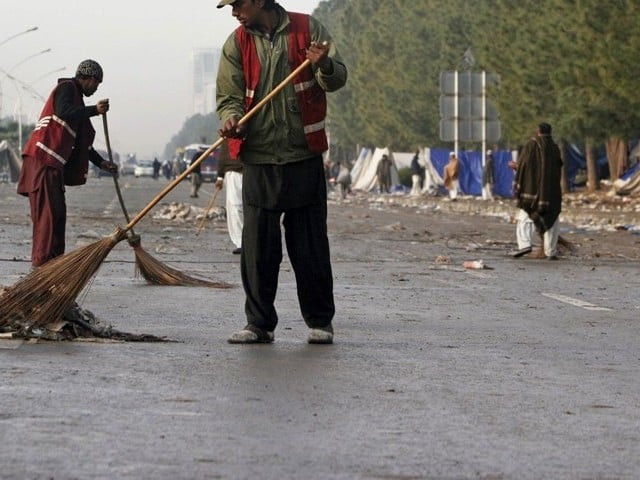Activists spotlight plight of sanitary workers
Health and safety facilities for sanitary workers demanded

Rights activists, labour leaders, government officials, public representatives and civil society campaigners have underlined the need to provide all constitutional and labour rights to sanitary workers, including minimum wages, leaves, medical facilities, old-age benefits, and death grants.
They spoke at a consultation on “Health Safety and Job Security of Sanitation Workers in Sindh” which was organized by the Sindh Human Rights Commission (SHRC) at a local hotel. They demanded machines and health and safety kits for the janitor staff in both public and private sector civic bodies.
They deplored that sanitary workers die cleaning gutters and manholes because they have to work without the health and safety kits required for such jobs.
SHRC Chairperson Justice (Retired) Majida Razvi said that sanitary workers have to work manually which poses a threat to their health and lives. “In our neighbouring countries, sanitary workers are provided with automated machines and gear for cleaning manholes and sewerage lines,” she said.
“Sanitary workers don’t have any protection, social security or old-age benefits,” she further said, adding that families of sanitary workers don’t have any medical facilities even those available under the labour laws.
She said that the SHRC has written letters to the Sindh Chief Minister, Minister of Labour, Department of Local Government and Provincial Ombudsman with recommendations to address issues of sanitary workers such as job regularization, protection against discriminatory practices and health hazards, compensation against accidents, social security, minimum wage, and implementation of occupational health and safety at workplace.
Read Justice for sanitation workers
Zulfiqar Ali Shah, Chairman of the Sanitary Workers Federation, said that even though public sector organisations, like municipal corporations, provide some facilities to sanitary workers, the private sector deprives them of any such facility. “No duty hours are fixed in the field, even during emergency days, like Eid, they have to work for 16-18 hours without any extra wages,” he said.
He further stated that many workers who sustain injuries in on-duty accidents are not provided with any medical facilities. “Those who lose their lives are not provided death grants or any financial support to their families,” he added.
Anis Haroon, member of the National Commission for Human Rights (NCHR), said that no data on the size of sanitary workers is available in the country. “Most Kundimen are facing health risk as they are sent into manholes without any safety kits which has resulted in many fatal incidents,” she said. “It is a big human rights violation,” she added.
Ashraf Naqvi, a former Joint Director for Occupational Safety and Health at Sindh Labour Department, said that Sindh was the first province that introduced a separate law for the occupational safety and health of workers. The laws cover all types of labour, including sanitary workers.
Under the law, an OSH council has been established which has representatives of workers as well. Although the law is being implemented, now standards for safety and health are being made, he added. According to him, death compensation is also available in the OSH law.



















COMMENTS
Comments are moderated and generally will be posted if they are on-topic and not abusive.
For more information, please see our Comments FAQ